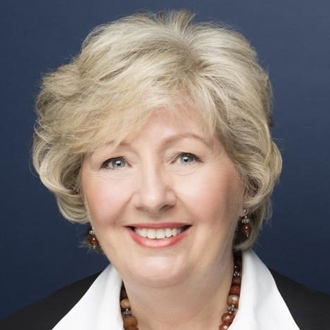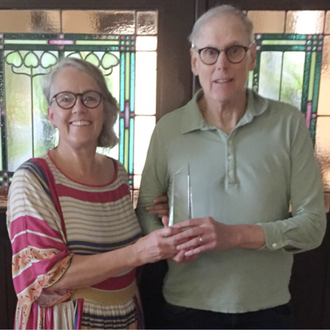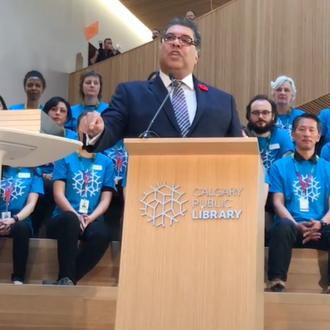A Letter from ULC Executive Board Chair Vickery Bowles
During the ULC Member Breakfast held on June 23, leaders from ULC libraries elected Toronto Public Library City Librarian Vickery Bowles as the new chair of ULC's Executive Board for 2019-2020. The below letter has been adapted from remarks Vickery provided during the Member Breakfast.

I am so honoured to be starting my term as the chair of the ULC Executive Board. In the past year I have been the vice-chair and working under the incredible leadership of Dr. Rhea Lawson. I cannot begin to tell you how thrilled I am to be following in Rhea’s footsteps and working with Susan Benton and her wonderful team.
When people ask how things are in libraries these days, I often say, this is such an exciting time to be working in public libraries. With many sectors talking about the critical importance of the knowledge economy, there is exponential change and digital disruption, and there is huge opportunity for libraries to make a difference. I am very optimistic and excited about the future of public libraries.
Part of why I am so optimistic is because our strengths, our core values are enduring. They are as important today as they have ever been. Children’s literacy, preserving the past, lifelong learning, intellectual freedom, equitable access to a diversity of information and ideas, accessible public space. I am optimistic because libraries have a willingness to evolve services to meet the needs of communities while still maintaining our core values and value propositions. We’ve done it over and over and over again throughout our 100 years of service. I feel it’s a huge asset that not all organizations have.
Another reason I am so optimistic is because of our willingness to work together. As leaders of urban libraries, and with the support of organizations such as ULC, we take on some of the most complex issues facing our times. I believe very strongly that in the digital age, public libraries have core capabilities and responsibilities to respond to these complex issues, making us well positioned to provide leadership in our communities, to our civic leaders and beyond.
The question is, do our civic leaders and funders ... recognize the importance of libraries in protecting our democratic values and freedoms?
The challenges we face as library leaders are extraordinary. In the fast-paced world of the 21st century, we are seeing more and more challenges to democratic freedoms and values throughout the world, as well as growing economic and other divides in our communities. While the internet offers a wealth of information and media delivers news content instantly as it happens, there is also a proliferation of publishers and producers of content from a wide array of sources making it easy to distribute misinformation on digital platforms — increasingly we see big name publishers limiting library access to e-books and e-audiobooks with restrictive pricing and licensing models — and machine learning algorithms are deployed to segment and filter people’s online experiences, shaping opinions, beliefs and perhaps even influencing election results.
Our library staff have become first responders in our cities, serving people living in vulnerable and high risk situations. Whether it’s mental illness, addiction issues or precarious housing, our staff are on the frontline responding with professionalism, compassion and support.
We all know this. We all know the social justice principles of equity and inclusion guide us and our staff in the work we do each and everyday. The question is, do our civic leaders and funders know this? Do they recognize the importance of libraries in protecting our democratic values and freedoms? Do they understand the importance and unique value of libraries as social infrastructure in our cities?
Eric Klinenberg in his book Palaces for the People recognizes this and the important role of libraries as shared, equitable public spaces that bridge divides and promote civic engagement. I am sure all are very familiar with Klinenberg’s book and his premise that the future of our democracies not only depends on shared values but on shared spaces as well, and library space — and all that happens within it — is a critical part of a community’s social infrastructure. So advocates such as Klinenberg help put a spotlight on the important role of libraries in our cities and our democracies. But we all know there is so much more to do.
Now more than ever, I believe we need to stand up, we need to work together to put our own spotlight on the issues challenging our core beliefs and values.
ULC is committed to promoting libraries’ unique value to local and civic leaders, telling them about the social capital and wealth of resources libraries provide to support the economic and social goals of our cities and counties, and to make sure no one gets left behind. ULC’s annual Forums, webinars, research and initiatives such as the Leaders Library Card Challenge, Partners for Middle School STEM and Strengthening Libraries as Entrepreneurial Hubs are all designed to promote the value of libraries and give us the tools and resources we need to advance our goals and continue to add value to our communities and our cities.
The Edge 2.0 technology assessment tool, developed by ULC, is another example of ULC providing libraries with the tools and resources we need to articulate and demonstrate our value. Edge provides an evidence-based approach to guide libraries of all sizes to set measurable, strategic goals for digital inclusion and to engage government and local leaders in meaningful conversations about 21st-century community needs. Libraries using Edge have incredible stories to share that speak to significant outcomes, such as increased funding for technology, engagement of local leaders in digital literacy and inclusion discussions and identification of service gaps that lead libraries in new directions with new services.
As library leaders, we have important work to do. Now more than ever, I believe we need to stand up, we need to work together to put our own spotlight on the issues challenging our core beliefs and values. Nowadays this means we need to stand up for journalists and a free press; we need to advocate for better oversight and regulation of big data companies; and for fair e-content pricing and licensing from big name publishers. We need to provide forums where people are encouraged to come together to engage in controversial discussions and debates civilly, being more tolerant of differing points of view. And we need organizations such as ULC where we can all come together to discuss these important issues, coordinate our efforts and ultimately make a difference in the cities and communities we hold so dear.
Vickery Bowles is the city librarian at Toronto Public Library, a 100-branch library system serving 2.7 million people. She believes passionately in the difference public libraries make in the lives of individuals, communities and cities. Vickery has worked in a number of leadership positions, spearheading service development including with Toronto’s high needs and diverse communities to develop library-led solutions that support capacity building, civic engagement and settlement. She is currently working to advance TPL’s new strategic plan and its digital strategies that support new service models, mobility, e-learning and innovation.
Related Articles

Honoring Bill Ptacek, Winner of the 2019 ULC Executive Board Award
Urban Libraries council
ULC celebrates the leadership and achievements of Bill Ptacek, former CEO of Calgary Public Library and recipient of the 2019 ULC Executive Board Award.
Learn More

Dreaming Big and Building Community
Urban Libraries Council
This blog is not only a blog, just as a library is not only a building. This new feature is a forum for the voices that are shaping the future of our field. It reflects the ever-changing definitions of 21st century libraries. Most importantly, it is what we — as a community — make of it.
